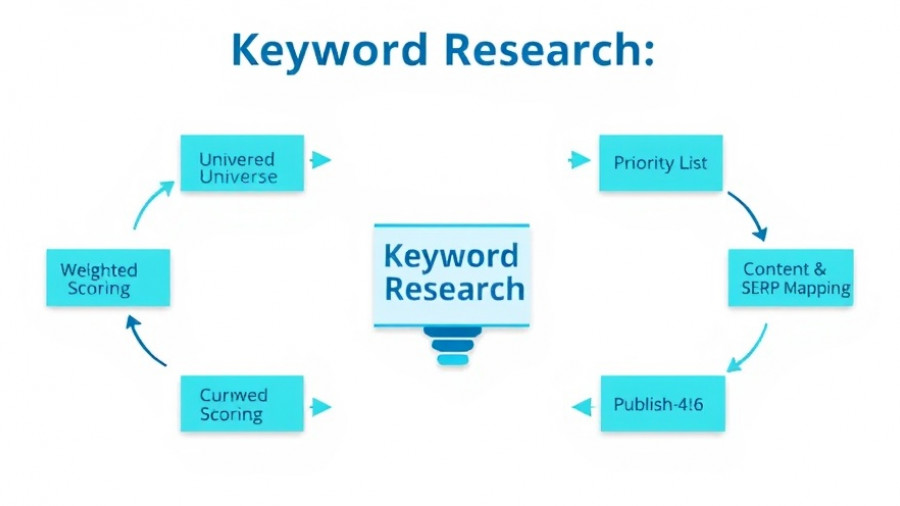
Understanding Google’s SEO Ranking Factors
In the dynamic realm of digital marketing, mastering search engine optimization (SEO) is no longer optional for businesses; it's essential. Nathan Gotch's recent exploration of the most powerful Google ranking factors provides invaluable insights for marketers, professionals, and business owners who wish to elevate their online presence. Achieving higher search engine rankings hinges on comprehending these factors—and this article aims to unpack key elements derived from Gotch’s expertise and recommendations.
In '7 Most Powerful Google Ranking Factors for SEO', the discussion dives into essential strategies for improving search engine visibility, exploring key insights that sparked deeper analysis on our end.
Indexation: The Foundation of SERP Rankings
The cornerstone of effective SEO strategy starts with proper indexing. As Gotch asserts, your web pages cannot rank if they aren't indexed. To ensure seamless indexing, businesses must tackle four crucial strategies: ensuring that the robots.txt file allows all crawlers, maintaining an updated sitemap, avoiding unnecessary no-index tags, and optimizing internal linking structures.
Utilizing tools like Screaming Frog can provide clarity on crawl depth and unique inlinks. Moreover, sites must optimize their loading speeds—a vital element that indirectly impacts user experience and consequently, rankings. If pages load slower than three seconds, they risk being overlooked by crawlers, making optimization a non-negotiable.
Matching Search Intent: Key to User Engagement
Next, understanding search intent is vital for effective content strategy. By placing oneself in the searcher's shoes, marketers can identify the true needs behind search queries. Generic head keywords like "SEO" often lead to ambiguity, while more specific phrases, such as "best SEO tools for agencies," allow businesses to tailor content that aligns with clearer user intents. Gotch's advice to analyze search result formats can guide content creators toward effective execution, enhancing both relevance and engagement.
Content Relevance: Ensure Value through Uniqueness
Uniqueness is crucial in content relevance, with Google's algorithms rewarding pages that add fresh perspectives. However, there's a balance to strike; becoming too unique can be counterproductive. A strong starting point is to focus on topic coverage rather than mere keyword saturation. Tools like Rankability's Content Optimizer facilitate understanding which topics competitors cover, thus creating a more rounded and competitive content offering.
Incorporating primary keywords strategically throughout content also provides additional relevance signals to search engines. Ensuring that keywords are present in the URL, title, meta description, and headers strengthens the odds of favorable evaluations from Google's algorithms.
Topical Authority: The Importance of Strategy
According to Gotch, establishing topical authority requires a well-defined content strategy. Businesses should concentrate on developing a topic cluster framework, covering core areas comprehensively. For instance, creating pillar content surrounding new products allows for the construction of supporting posts that enhance overall authority in the niche.
The core principle here is that content should not be produced randomly; each piece must fit into a larger strategy that helps build internal links and strengthen domain authority. Doing so amplifies reach and demonstrates expertise.
Backlink Quality: The Quintessential Ingredient
No SEO strategy is complete without a focus on backlinks. As Gotch highlights, the quality of backlinks surpasses quantity. Earned links from highly reputable sources can offer more value than many lower-quality links combined. Conducting an in-depth analysis of potential backlinks to ensure they possess the ideal combination of authority, relevance, and traffic potential is critical for leveraging SEO effectively.
Using tools such as HREFS can assist in uncovering which sites can provide the highest quality links that will bolster search ranking and visibility.
Brand Signals: Building Trust and Credibility
Lastly, establishing brand signals is key to enhancing a site’s reputation. High-quality backlinks coupled with positive reviews across various platforms can solidify a business's legitimacy. This is especially important for local businesses that can build presence through Google Business and niche review sites.
In today’s climate, integrating efforts to gather diverse reviews and citations from relevant platforms can also improve visibility in AI platforms that draw from various authoritative sources.
Call to Action: Join the SEO Revolution
As businesses navigate the complexities of SEO, leveraging the insights shared by thought leaders like Nathan Gotch can provide a substantial advantage. For those looking to enhance their understanding and capabilities, applying for Gotch SEO Academy is a valuable next step. This platform offers unique training that champions the latest trends in AI search and SEO, positioning businesses to dominate an increasingly competitive landscape.
For marketers and owners seeking sustainable growth, it’s time to act. Fortify your strategies and enroll today!
 Add Row
Add Row  Add
Add 




Write A Comment